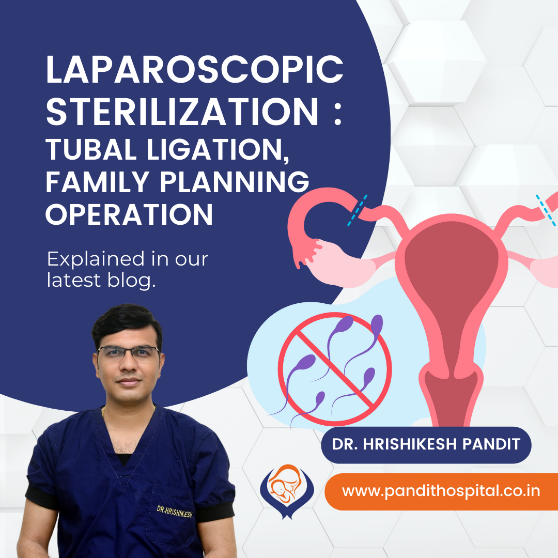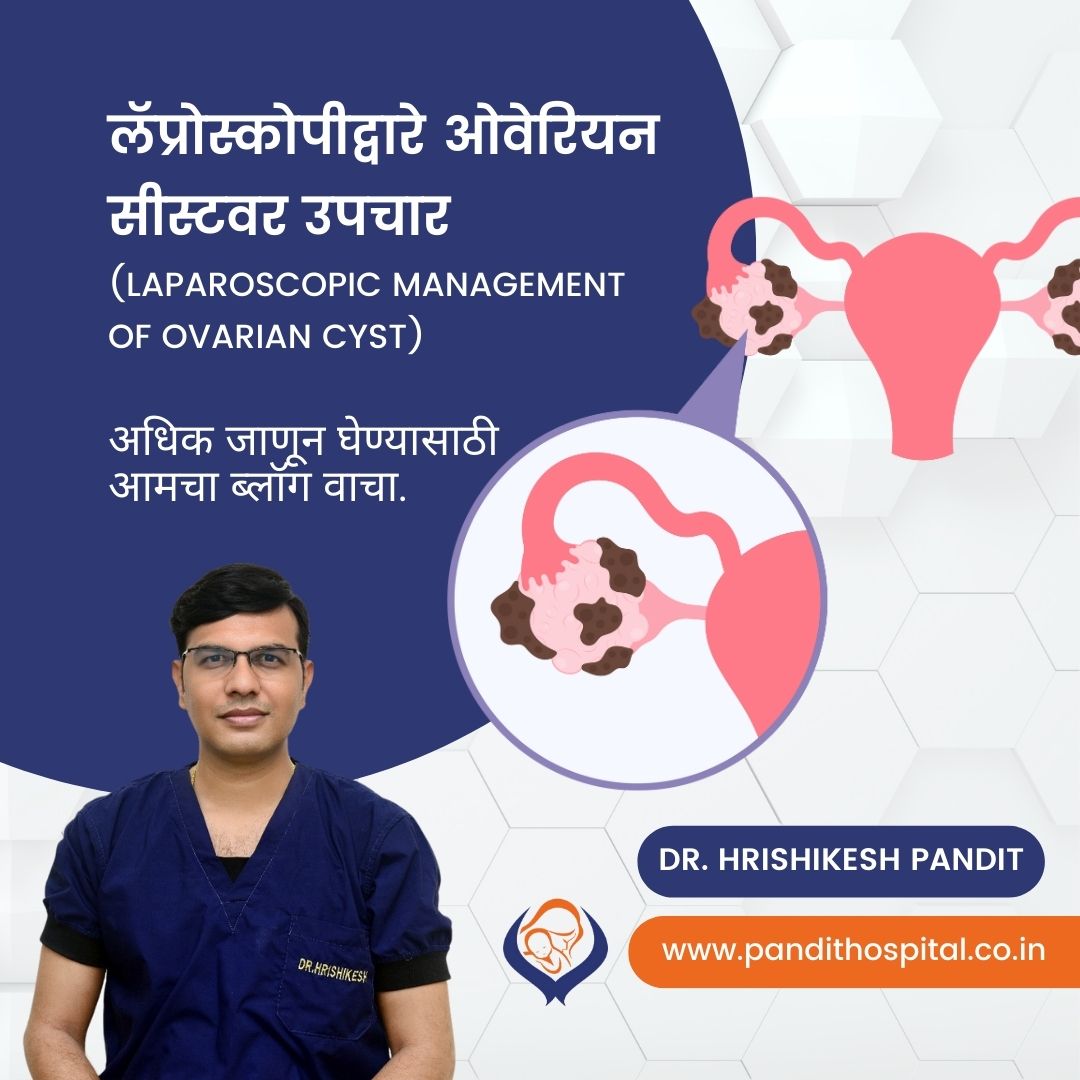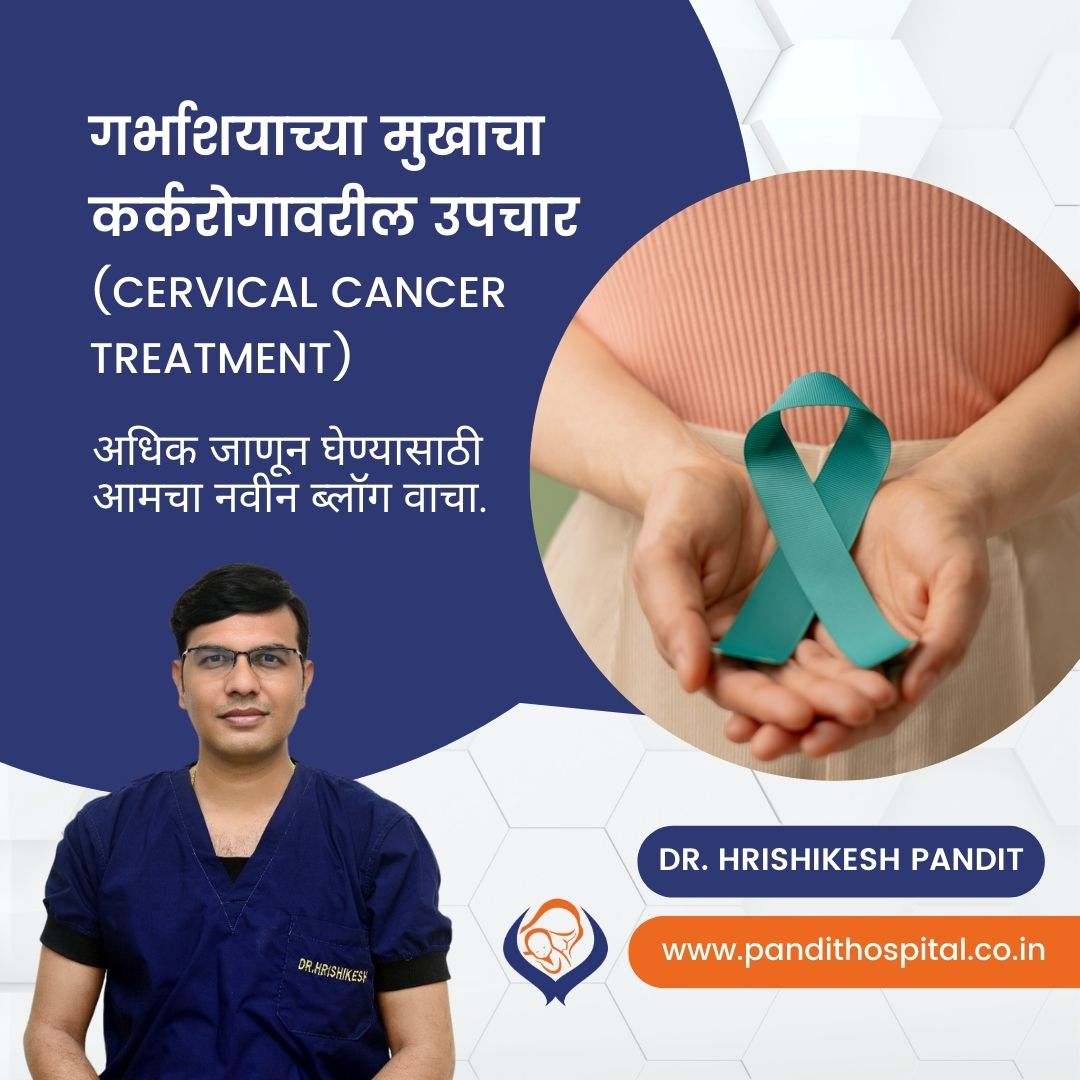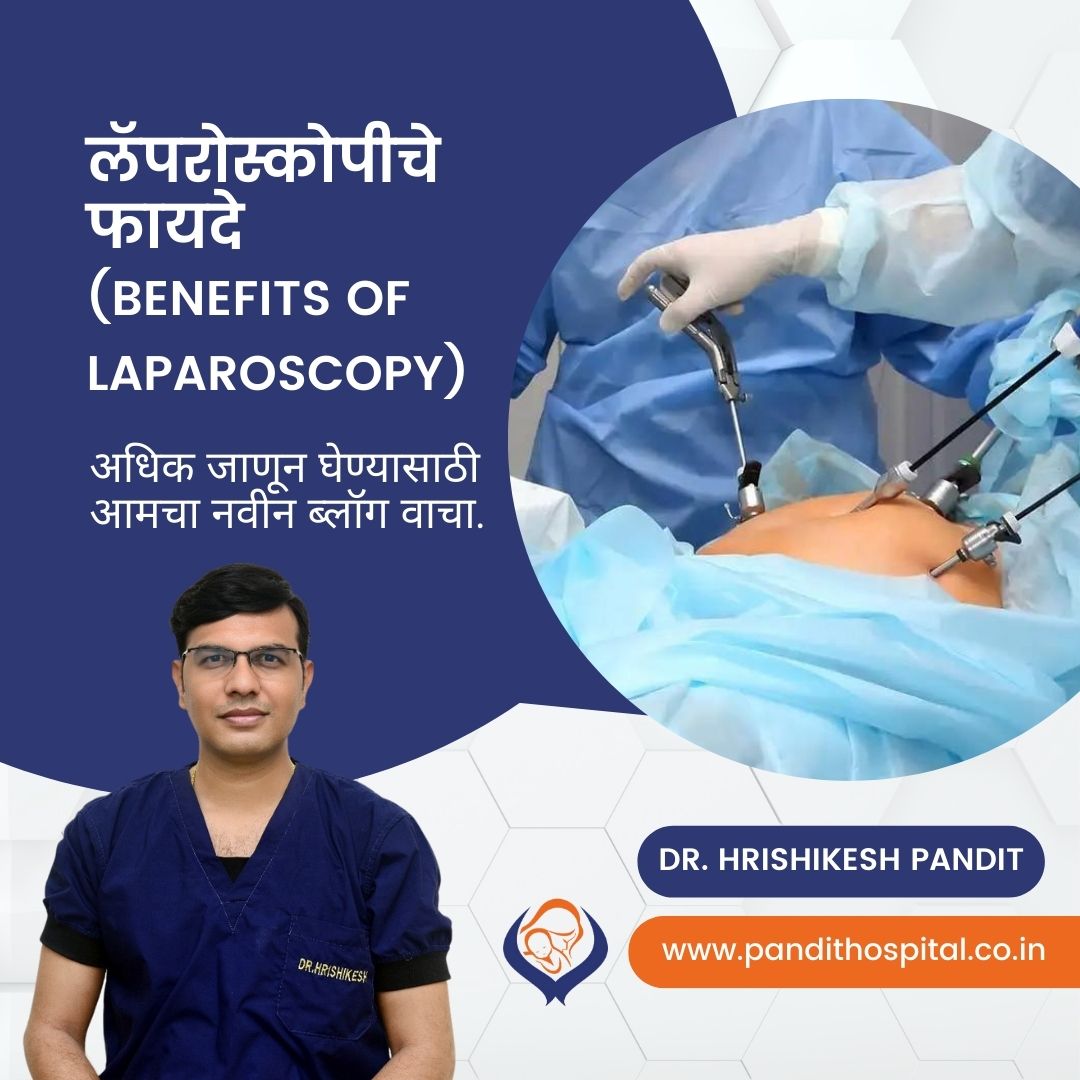With the population explosion, day-by-day the need of family planning operation has become necessity. Laparoscopic sterilization by “Tubal Ligation”, is an excellent option. As it is very accurate, less painful, less bleeding, minimal hospital stays and most importantly a very effective contraceptive method. Dr. Hrishikesh Pandit of Pandit Hospital provides best option of 3D laparoscopic Tubal Ligation surgery option at Pandit Hospital, Bhingar, Ahmednagar. He has explained some important points about this operation in this health blog.
A Tubal ligation, also known as “getting your tubes tied,” is a surgical technique that is extremely successful at preventing pregnancy. It entails cutting, obstructing, or closing up your fallopian tubes to prevent sperm from fertilizing your eggs. The fallopian tubes are referred to as “tubal”. The word “ligation” signifies “tying.” During this surgery, your fallopian tubes are cut and knotted with a specific thread (suture) or obstructed with a clamp, clip, or band. This process can be done as an open surgery or a laparoscopic surgery. When done laparoscopically it is called as laparoscopic sterilization.
Why people choose laparoscopic sterilization as family planning operation?
Laparoscopic sterilization is the most effective (99%+) sterilization method with tubal ligation procedure. If you are certain that you do not want to get pregnant or become pregnant again, having your tubes tied is a safe and convenient method of contraception. It permits you to have sex without fear of becoming pregnant. It helps you to avoid burden of pregnancy and child in future.
- Causes minimal discomfort.
- Requires little operating time (usually 5 to 15 minutes).
- Leaves a very small scar.
- Has a short post-operative recovery period.
- Is permanent and effective immediately.
- No further contraception is required.
- No long term side effects.
What are the eligibility factors to undergo laparoscopic sterilization?
First of all, any married female patient can undergo laparoscopic sterilization. She does not need partner’s consent to undergo sterilization.
- Female should be ever-married.
- Female clients should be above the age of 22 years and below the age of 49 years.
- The couple should have at least one child, whose age is above one year, unless the sterilization is medically indicated.
- Female or their spouses/partners must not have undergone sterilization in the past (not applicable in cases of failure of previous sterilization).
- Female must be in a sound state of mind, so as to understand the full implications of sterilization.
- Mentally ill females must be certified by a psychiatrist and a statement should be given by the legal guardian/spouse regarding the soundness of the client’s state of mind.
- A relevant medical history, physical examination and laboratory investigations need to be completed to ascertain eligibility for surgery.
At Pandit Hospital, Bhingar, Ahmednagar, we provide laparoscopic sterilization: Tubal ligation a family planning operation with the most advanced laparoscopic technology.
Yes, we also provide tubal ligation reversal surgery in case of patients who wish to become pregnant again.
Do you get periods after tubal ligation operation?
Yes. Your menstrual cycle is still intact after tubal ligation operation. Eggs also mature and gets released and menstruation occurs after tubal ligation procedure.
Can you get STDs after tubal ligation surgery?
Yes, it doesn’t work like a barrier method so STDs can be transmitted even after tubal ligation surgery.
At Pandit Hospital, Ahmednagar; Dr. Hrishikesh Pandit has the experience of more than 5000 laparoscopic surgeries and has best 3D laparoscopy technology at his centre to provide best results.
Dr. Hrishikesh Pandit is the pioneer pf 3D laparoscopy technique in Ahmednagar. His experience and skill makes him one of the best laparoscopic surgeon in India.
At Pandit Hospital, you are in safe hands!
To consult Dr. Hrishikesh Pandit, Click Below,
Pandit Hospital – Best Maternity care center in Ahmednagar
LET’S SEE OUR INTRO VIDEO
At Pandit Hospital, we provide all the maternity services from antenatal to postnatal period under one roof
Let's Connect!!
0241-2441717 / 0241-2442344
About author:
Dr. Hrishikesh Pandit:
Dr. Hrishikesh Pandit is one of the best obstetrician and gynecologist in India. He is also a well-renowned Laparoscopic surgeon. He obtained his MS (Ob Gyn) degree from the prestigious Pravara Institute of Medical Sciences. He has also done fellowship and diploma courses in laparoscopic surgeries and cancer treatment from Tata Hospital and Keil University, Germany. His surgical cases, papers and videos has been chosen in many international forums of gynecology.
At Pandit Hospital, we are always working hard to provide its patients with the highest level of medical innovation and patient care. With the aim of delivering complete maternity & gynecological care under one roof with the help of all contemporary amenities and cutting-edge medical equipment. Dr. Hrishikesh Pandit has a vision to bring the best of facilities regarding laparoscopy surgeries in the city of Ahmednagar. He is the pioneer of 3D Laparoscopy technology is Ahmednagar.
Latest Articles
Dr. Hrishikesh Pandit is one of the best laparoscopy surgeons in India. His determination to bring 3D Laparoscopy technology to Ahmednagar has eventually helped so many patients. Read the latest articles by Dr. Hrishikesh Pandit on Gynecology, gastric issues, and health tips for mothers during pregnancy.
Discover comprehensive ovarian cyst treatments at Pandit Hospital in Ahmednagar, Maharashtra, led by 3D Laparoscopic Surgeon Dr. Hrishikesh Pandit. Learn about types, symptoms, and both surgical and non-surgical treatments. Best ovarian cyst removal hospital in India.
गर्भाशयाच्या मुखाचा कर्करोग हा महिलांमध्ये होणारा दुसरा सर्वात गंभीर कॅन्सर आहे. वयाच्या 35 व्या वर्षानंतर या आजाराचा धोका फार वाढतो. गर्भाशयाच्या कर्करोगावर लॅपरोस्कोपी (दुर्बिणीने) शस्त्रक्रियेद्वारे उपचार केले जाऊ शकतात.
लॅपरोस्कोपिक शस्त्रक्रियेचे अनेक फायदे आहेत ✔ कमी वेदना ✔ कमी रक्तस्त्राव ✔ रुग्णालयात किमान मुक्काम ✔ जलद रिकव्हरी ✔ कमी कॉम्प्लिकेशन्स ✔ कमी टाके ✔अंतर्गत अवयवांना कमी इजा. Benefits of laparoscopy &Marathi)
FAQ
You should consult a doctor during the first 6 to 8 weeks of your pregnancy, or when your period is 2 to 4 weeks late.
If your contractions are 5 minutes apart, lasting for 1 minute, for 1 hour or longer, it’s time to head to the hospital.
Doctors recommend an infertility evaluation if you have not gotten pregnant after 1 year of having regular sexual intercourse without using birth control. If you are older than 35, an evaluation is recommended after 6 months of trying.
Yes, You can. But most babies need 39 weeks to develop fully. Induced or planned delivery before that time—without a valid medical reason—is not in the best interest of the baby or the mother. After 39 weeks you can plan delivery.
Women who are 21 to 29 should have a Pap test alone every 3 years. HPV testing alone can be considered for women who are 25 to 29, but Pap tests are preferred. Women who are 30 to 65 have three options for testing. They can have a Pap test and an HPV test (co-testing) every 5 years. They can have a Pap test alone every 3 years. Or they can have HPV testing alone every 5 years.
Laparoscopic hysterectomy is a safe and suitable procedure for chosen patients. It affords patients advantages like less peri-operative morbidity, better life quality, shorter hospitalization time, and faster return to activity.
Schedule a doctor’s visit if you have: Greenish, yellowish, thick or cheesy vaginal discharge; Strong vaginal odor; Redness, itching, burning or irritation of your vagina or the area of skin that surrounds the vagina and urethra (vulva); Bleeding or spotting unrelated to your period.
Painless delivery can be achieved using a form of regional anesthesia that provides pain relief during natural labor. Epidural anesthesia is administered through an injection on the lower back of the mother. The drug takes about 10-15 minutes to take effect.
Even in severe cases of endometriosis, most can be treated with laparoscopic surgery. In laparoscopic surgery, your surgeon inserts a slender viewing instrument (laparoscope) through a small incision near your navel and inserts instruments to remove endometrial tissue through another small incision.
The HPV vaccine is recommended for routine vaccination at the age of 11 or 12 years. (Vaccination can be started at age 9.) It is also recommended that vaccination for everyone through age 26 years if not adequately vaccinated when younger. HPV vaccination is given as a series of either two or three doses, depending on age at initial vaccination.





